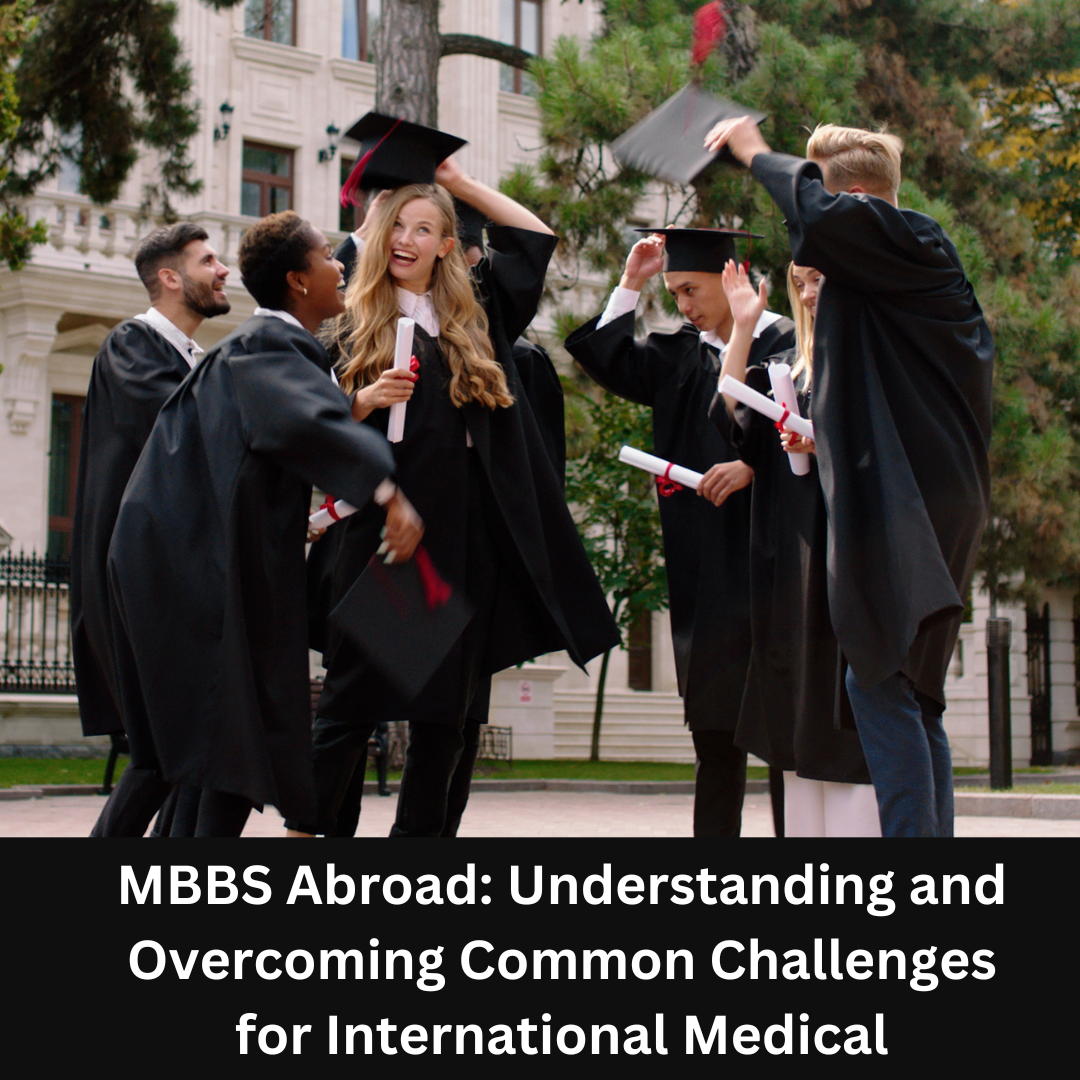MBBS Abroad: Understanding and Overcoming Common Challenges for International Medical Students
Pursuing an MBBS degree abroad offers students the chance to experience a diverse education, develop global perspectives, and become internationally recognized medical professionals. However, this journey is not without its challenges. Studying MBBS abroad comes with unique obstacles, from language barriers to financial strains and cultural adjustments. Here’s a comprehensive look into the challenges MBBS students may face abroad and strategies for navigating these effectively.
Common Challenges of Studying MBBS Abroad
- Language and Communication Barriers
- Many students face language barriers when pursuing MBBS in non-English-speaking countries. Although some universities offer programs in English, students still need to learn the local language for effective communication with patients during clinical rotations and daily interactions.
- Misunderstandings due to language differences can impact learning and patient care during practical sessions, especially in countries like Russia, China, or Germany, where proficiency in the native language is essential.
- Cultural Adjustment and Homesickness
- Adapting to a new culture can be challenging, especially when social norms, lifestyle, and etiquette differ from those back home. This “culture shock” can lead to feelings of isolation, loneliness, and homesickness.
- Different festivals, dietary habits, weather, and daily routines can make it difficult to feel at home, and it often takes time to get comfortable in a foreign environment.
- Academic and Clinical Rigor
- Medical studies are challenging no matter where they’re pursued, but international students may find additional academic pressures due to unfamiliar teaching styles and grading systems.
- Students are expected to master theoretical knowledge while acquiring hands-on clinical skills, which can be overwhelming, particularly in a foreign language and healthcare system.
- Financial Strain
- Even though MBBS programs abroad are often more affordable than those in Western countries, students may still experience financial pressures due to exchange rate fluctuations, accommodation costs, and other unexpected expenses.
- In addition, students from certain countries may find that part-time work is limited or restricted, meaning they must rely on savings or family support to cover living expenses.
- Licensing Exams and Recognition
- After completing an MBBS abroad, students must clear a licensing exam in their home country (such as the FMGE for Indian students) to practice medicine. These exams are often rigorous and require thorough preparation.
- Additionally, the medical curriculum abroad may not align perfectly with the requirements back home, and students may need to study extra material to be fully prepared.
- Adapting to Different Clinical Practices
- Healthcare systems vary from country to country, and the clinical approach in some regions may differ significantly from those in students’ home countries.
- For example, certain treatments, medical equipment, and healthcare protocols may not align with what students have seen back home, which can make clinical training challenging.
- Accommodation and Living Conditions
- Finding suitable accommodation in a new country can be a challenge, as students may not be familiar with local rental processes, neighborhoods, or housing options.
- Dormitories may differ in terms of facilities, and some students may struggle to adapt to communal living or adjust to local food and living habits.
Strategies to Overcome Challenges While Pursuing MBBS Abroad
1. Language Preparation and Practice
- Learn the Basics Before Arrival: Many students find it helpful to learn the basics of the host country’s language before arriving. Apps like Duolingo, Babbel, and Rosetta Stone can be excellent resources.
- Enroll in Language Classes: Most universities offer language classes to help international students. Participating in these classes can make it easier to interact with patients and locals.
- Practice in Real-Life Scenarios: Language barriers ease faster when practicing in real-life situations. Try speaking with local peers, joining community activities, and engaging in simple conversations daily.
2. Embrace Cultural Adjustment
- Learn About the Host Culture: Reading about the host culture, customs, and traditions before arrival can reduce culture shock. Websites, travel guides, and online forums can be helpful resources.
- Join Student Groups and Cultural Exchanges: Connecting with fellow students and participating in cultural exchange programs will help build a support system and ease feelings of loneliness.
- Stay Connected with Home: Regular calls or video chats with family and friends can help combat homesickness. Bringing a few personal items from home may also create a sense of comfort.
3. Focus on Academic Success
- Seek Academic Support: Many universities provide tutoring services, mentorship programs, or academic advising to help international students stay on track.
- Manage Your Time Wisely: Medical studies demand disciplined time management. Create a study schedule, prioritize tasks, and set aside regular time for review.
- Connect with Professors and Seniors: Reaching out to professors and senior students can provide clarity on academic expectations and study tips for better performance.
4. Plan Finances and Budget Carefully
- Estimate Costs in Advance: Make a realistic budget for tuition, accommodation, food, transport, and personal expenses. Consider exchange rate fluctuations and create a backup plan.
- Explore Scholarships and Part-Time Jobs: Some universities offer scholarships or financial aid for international students. Depending on the country’s regulations, students may also be able to take up part-time work to support themselves.
- Track Expenses Regularly: Use budgeting apps to monitor spending and ensure funds last throughout the semester or academic year.
5. Prepare for Licensing Exams Early
- Understand Licensing Requirements: Research the requirements for licensing exams in your home country, such as FMGE, USMLE, or PLAB, to ensure you’re adequately prepared.
- Take Extra Coaching if Needed: Some students may require additional coaching to prepare for these exams. Online courses and test prep programs can be highly beneficial in covering gaps.
- Stay Updated on Exam Changes: Licensing exams sometimes change formats or update syllabi. Stay informed of any updates to ensure your preparation aligns with current standards.
6. Adapt to Local Clinical Practices
- Observe and Ask Questions: When engaging in clinical rotations, observe local practices, procedures, and treatments. Don’t hesitate to ask questions if you’re uncertain about any procedures.
- Build Relationships with Local Mentors: Mentors can provide valuable insights into the healthcare system and clinical practices in the host country, offering you guidance on how to adapt effectively.
- Practice Flexibility and Open-mindedness: Be willing to embrace different medical practices and approaches. Developing a flexible mindset will help you adjust and gain a broader perspective on healthcare.
7. Seek Suitable Accommodation
- Research University Accommodation Options: Many universities offer dormitory housing, which is often the most convenient and affordable option for international students.
- Use Online Resources to Find Apartments: If you prefer living off-campus, use trusted websites and local contacts to find safe and affordable rental options.
- Consider Living with Other International Students: Sharing accommodation with other international students can help create a comfortable, supportive living environment where you can share experiences and adjust together.
Benefits of Studying MBBS Abroad Despite the Challenges
Despite these challenges, studying MBBS abroad has numerous benefits, including:
- Global Recognition: Many countries offer globally recognized MBBS degrees, opening doors to international medical careers.
- Diverse Clinical Exposure: Students gain exposure to diverse medical cases, patient demographics, and healthcare systems.
- Personal and Professional Growth: Facing and overcoming challenges abroad fosters resilience, adaptability, and intercultural competence, skills that are invaluable in medicine and life.
- Language Proficiency: For students studying in non-English-speaking countries, the need to learn a new language enhances communication skills and provides an advantage in multilingual settings.
Conclusion
While studying MBBS abroad comes with challenges, these experiences ultimately shape students into adaptable, resilient, and globally-minded healthcare professionals. With adequate preparation, an open mindset, and a proactive approach, students can overcome these obstacles and enjoy a fulfilling and enriching academic journey.
Eclave is here to support you at every stage of this journey, offering guidance on everything from language preparation and cultural orientation to financial planning and academic success. With the right support and strategies, the challenges of studying MBBS abroad can be stepping stones to a successful, impactful medical career

